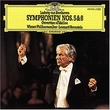| All Artists: Mendelssohn, Karajan, Bpo Title: Karajan Collection - Mendelssohn: 5 Symphonien Members Wishing: 0 Total Copies: 0 Label: Deutsche Grammophon Release Date: 7/3/1990 Genre: Classical Styles: Historical Periods, Modern, 20th, & 21st Century, Symphonies Number of Discs: 3 SwapaCD Credits: 3 UPC: 028942966420 |
Search - Mendelssohn, Karajan, Bpo :: Karajan Collection - Mendelssohn: 5 Symphonien
 | Mendelssohn, Karajan, Bpo Karajan Collection - Mendelssohn: 5 Symphonien Genre: Classical
|
Larger Image |
CD DetailsSimilar CDsSimilarly Requested CDs
|
CD ReviewsGreat Pieces, Conducting and Playing in a Pretty Box Russell J. Grasso | Massachusetts, USA | 06/03/2002 (5 out of 5 stars) "If any one has any doubt as to whether Karajan is one of the greatest conductors of all time, they should listen to symphonies 1, 4 and 5 on this collection. Even if you despise the large license Karajan takes with unmarked tempo changes, you will still be in admiration of these interpretations for how he chooses which voices receive emphasis in the various passages of Mendelssohn.Symphony #1 in C Minor opens the collection with unrivaled power and passion and takes us completely by surprise. That such an uncommonly played work comes across with the combined fire of a Beethoven Symphony and the lyricism of a Schubert Symnphony is due to Mendelssohn's genius and Karajan's masterful interpretation. To have in your collection the first and last movements with their powerful codas alone is worth the price of this set (even if you have 3 and 4 already).Mendelssohn gives the T'bones some theme play in the opening of Symphony #2, which is an enjoyable work for his followers, and possibly Fidelio fans. Unfortunately, performance-wise, Berlin's ten movement Symphony #2 (yes, I said 10 movements) is the disapointment here, because, as expected, Karajan loses grace whenever solo singers were involved. But beyond that, even the instrumental movements were not delivered with the care and fore-thought of the other symphonies rendered in this set. And this was not always Karajan's fault: this is an extremely large and varied symphony to pull off well, a proverbial Bach mega-Cantata or Handel mega-Oratorio. Furthermore, the singing in this symphony is not on the same level of the playing in the other symphonies (particularly with the weak choice for Soprano-I) so the inclusion of this particular Symphony #2 is somewhat of a "mis-match" in the set.Nevertheless, the balance of the works still makes this set an interpretation of choice for Mendelssohn symphonies. The Scottish's Maestoso is very dramatic; the Italian's Saltarelo is furious, agile and extremely clean-played. Mendelssohn's 5th symphony, although a great work, is not revered for its orchestration, but Karajan and the Berliners summon a full-bodied effect in a majestic reading.Anyone who enjoys Beethoven, Schubert or Schumann symphonies will be very happy with this set. The recording is the widely-preferred ADD, and is relatively clean and bright, recorded in the early 1970s. In symphonies 3 through 5, the recording engineers mic'd with an emphasis on treble, probably and understandably to show off the Berlin violinists. Subsequently, I find myself playing it back emphasizing the bass to even things out and add more impact.Several pages of liner notes in English are provided which are both historic and critical of the performances at hand. Additionally, there are German and English lyrics to Symphony #2, one of Mendelssohn's paintings, several Mendelssohn portraits and a photo of the orchestra/conductor in action. And lest I not forget the conductor's signature on the cover.Although the case is very durable and agreeable, what is remarkable is the outer cardboard cover which has an almost holographic pastel wash ghosted into the glossy white finish, reminiscent of the special printed effects of DG on their circa 1975 vinyl album covers." The finest alternative on the Mendelssohn's Symphonies Javier Luna | Mountain View, CA United States | 06/29/2000 (5 out of 5 stars) "Karajan recorded this cycle in the early 70's when he was at the peak of his conducting career. It is widely considered to be one of his best recordings of this period. The whole recording sounds surprisingly fresh. The Hymn of Praise brings a captivating, completely full sound... The choral singing is remarkable in its vividness. Both the Scottish Symphony and the Italian one demonstrates why the Berliner Philarmoniker was king of the hill at that point in time: superb playing with displays of geniality that would put a smile on Mendelssohn's face. A must have!" Controlled somewhat unidiomatic performances Larry VanDeSande | Mason, Michigan United States | 05/11/2006 (3 out of 5 stars) "For years I read reviews of this set just like those by four of the five reviewers that preced me here. They gushed over the wonderful playing of the Berlin Philharmonic Orchestra and the way Herbert von Karajan moulded phrasing in these wonderful works.
Having read those reviews for the better part of 30 years -- and still being skeptical of this conductor's way with music like this, that requires charm with Germanic drive to be effective -- I put off purchasing this set until it became very inexpensive. Based on first hearings of these symphonies, I am very pleased I only spent $11 to acquire this set. I don't argue that Karajan is a great conductor, nor do I argue that his Berlin Philharmoic performed these works with brilliance and razor-sharp execution so dramatic it is capable of entry into the School of Industrial Perfection. What I would argue are the elements typical to many of Karajan's recordings are on high display here -- his controlling nature, which rarely allows the music to breathe or unfold naturally; his Germanic nature to push forward every concluding allegro with a high profile timpani beat, as if it were a march; and a recording style that puts emphasis on brilliance of the upper range while essentially eliminating everything at the bottom. Put in the simplest terms, Karajan often drags in these symphonies where other conductors, whose cpollective temperament is perhaps more conducive to Mendelssohn, soar. This is particularly true in the Symphonies Nos. 2 and 5, where Karajan is downright stodgy in the way he leads the orchestra. He comes forward a bit in tempo and imagination in the choral section of Lobgesang, but he is frankly deadly dull in the Reformation. I did enjoy many felicities in his approach to the Italian, which left me wondering how he could stay so earthbound in the lesser lights. I would recommend anyone considering this set to give equal, perhaps greater, consideration to the recently returned to circulation set of Mendelssohn symphonies, concertos and overtures where Claus Peter Flor leads the Bamberg Symphony in the symphonies and overtures. In my opinion, Flor has every quality of a good Mendelssohn conductor -- he is romantic, fleet, fantastic and leads much more imaginative and less rigidly constructed symphonies than the old German hand. I have always enjoyed Karajan's Strauss and sometimes his Bruckner and Beethoven. But, on the basis of his work in this set, I don't think he had a similar affinity for Mendelssohn, at least not in the recording studio late in his career. Most people that saw him in concert say he was far more spontaneous in the concert hall and his concert recordings on the Andante label seem to verify this. Unfortunately, that freedom of expression is rarely on display in this set, whose 1971-73 ADD sound has not been much improved by the current remastering." |

 Track Listings (8) - Disc #1
Track Listings (8) - Disc #1













